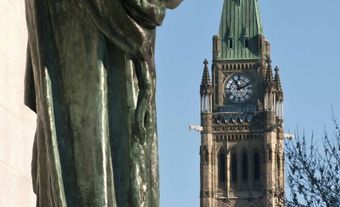Sunday Shopping
On 24 April 1985 the Supreme Court of Canada in the BIG M DRUG MART case struck down the Lord's Day Act on the grounds that it contravened the freedom of religion and conscience provision in the CANADIAN CHARTER OF RIGHTS AND FREEDOMS. Mr Justice Dickson concluded that the purpose of the Lord's Day Act was sabbatical observance and held that "To the extent that it binds all to a sectarian Christian ideal, the Lord's Day Act works a form of coercion inimical to the spirit of the Charter and the dignity of all non-Christians. It takes religious values rooted in Christian morality and, using the force of the state, translates them into a positive law binding on believers and non-believers alike."
Legislative Traditions
The federal Lord's Day Act made it an offence to transact business on Sunday. It was part of a legislative tradition which started in the 17th century in England. An "Act for punishing divers Abuses committed on the Lord's Day," called Sunday, was passed during the reign of Charles I.
Constitutionality
While the Big M case was a landmark decision, it did not end the Sunday closing controversy. In fact it was probably just the first case of what will likely become known as the Supreme Court Sunday closing trilogy. The Big M decision stands for the proposition that legislation which has as its purpose the promotion of religious values is constitutionally suspect. It did not address the constitutional validity of provincial Sunday closing legislation designed to accomplish other than religious purposes, such as the promotion of family activities, or the impact the equal protection section of the Charter will have on Sunday closing legislation.
The Supreme Court of Canada tackled the former issue in the Edwards Books case in 1986. At stake was the constitutionality of Ontario's Retail Business Holiday Act, a law which made it an offence to carry on retail business on Sunday and other holidays. The Court was satisfied that the purpose of the impugned law was the provision of uniform holidays for retail workers and dismissed claims that the statute was a colourable attempt to promote the religious observance of Sunday. Consideration was also given to the effect the Retail Business Holiday Act had on business, consumers and others in society.
The Court appreciated that those with a religious obligation to rest on a day other than Sunday paid a higher price for religious fidelity than those who observed Sunday or no day. This was true for retailers and consumers who observed Saturday as the Sabbath. The latter would be open for business one less day a week than the Sunday observer and the former would find few stores open for business on Sunday. However, as significant as these burdens were on Saturday observers, they did not deter the Court from adjudging that the state interest in a common pause day was of overriding importance and that the Act was valid. Of vital importance was the fact that the Act provided an exemption for those businesses which closed on Saturday.
Equal Protection Doctrine
The Alberta Court of Appeal dealt with the equal protection doctrine in its 1988 decision in the London Drugs case. It rejected an equal protection challenge to a municipal bylaw which obliged some retailers, as opposed to other sectors of the business community, such as wholesalers, manufacturers and construction enterprises, to close one day a week. The Court concluded that a "legislature may choose to cure the most pressing needs, and select simple workable legislation; it need not tune with great precision."
These 3 decisions mean that federal and provincial laws and municipal bylaws which use Sunday closing rules to promote nonreligious objectives (such as family activities) and grant exemptions to those whose religion recognizes a day other than Sunday as of special significance will survive Charter review.

 Share on Facebook
Share on Facebook Share on X
Share on X Share by Email
Share by Email Share on Google Classroom
Share on Google Classroom


